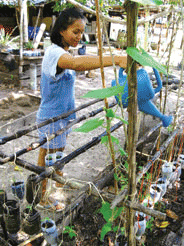 |  |
 |
 |
|
May 28, 2009 12:29 am GMT+7 |
|
Article Categories
|
|
|
 |
 |
 |
 |
 |
 |
 |
 |
 |
 |
 |
 |
 |
|
Article
|

|

THE ECO-WAR IS still raging along the Southern Andaman coast.
While Phuket clings to the idea of maintaining its unspoilt natural splendour, and its ‘paradise’ badge, environmentalists despair at the ever-increasing tourist machine spoiling the landscape. Kim Obermeyer and his team of 11 eco-warriors have set up a base camp and an eco-lodge on Koh Ra Island in Phang Nga province, just north of Phuket. The 39-year-old country co-ordinator for the Reef Check coral reef conservation group, said Thailand needed an alternative option to the ‘over supply of high-impact mass tourism’. “We offer tourists the opportunity to get up close and personal with nature,” he said. Guests stay in one of 18 wooden-stilted guest houses in the compound with only a single diesel generator providing electricity each night between 6 and 11pm to compliment the power produced by a battery of solar panels. Koh Ra is two-hour drive from Phuket and a 30 minute long tail boat ride from the Kuraburi Pier. The island, which was a Japanese outpost during World War II, is covered in evergreen jungles, orchids and butterflies. More than 60 rai of jungle blankets a 15-kilometre stretch which is home to giant hornbills, scaly anteaters, leopard cats, binturong (a rare bearcat), barking deer, gliding gekko’s, flying lizards, and purple hermit crabs. Mr Obermeyer is waiting for the National Park Committee to grant the island National Park status. If Kho Ra gets the go ahead, the eco-lodge will serve a vital role in assisting managing the National Park, and will help will help monitor the coral reef, with jungle surveying, mapping and solar energy initiatives. The eco-lodge is financially self-sustainable and was booked out over Christmas and the New Year. “The progress of the lodge is outstanding,” he said. “The solar panels are working and we have completed a number of projects with people from the local communities.” The land where the eco-lodge now stands was once home to more than 200 sea gypsies, who foraged for food in the fertile jungles, which are rich in fruit and home to hundred-year-old mango trees. Today, there are only about 20 villagers left. “We take small groups there to meet the remaining villagers and learn about their lifestyle, we help with projects and hike with their guides in the jungle to learn about traditional uses for wild plants,” said Mr Obermeyer. The eco-warriors have forged a close relationship with the villagers and are currently building them a better well to improve their supply of fresh water. The eco-warriors have initiated a series of coral reef and jungle ecology and conservation projects and are looking for more ‘volun-tourists’ to help them. American wildlife biologist, Jarrod Raithel and his wife Heather are teaching the local community about wildlife conservation. The team has planted a vegetable gardens, and set up a chicken farm so villagers are less dependent on ‘jungle meat’, or rare bird life found in the jungles of Koh Ra. Mr Obermeyer said that long term source of income was needed to create an effective eco-lodge that provided successful conservation management. “Self-sustenance is the key here, and we don’t have time to wait years while we write grant proposals to donors,” he said. Mr Obermeyer said the ‘volun-tourists’, were the financial foundations of the project and its ongoing success. “We also collaborate with several Thai universities including Chulalongkorn, Kasetsart and Ramkhamhaeng,” he said. “The Universities use our findings in their reports to the National Parks office.” For information on how to get involved at the eco-lodge visit www.thaiecolodge.com, or e-mail info@thaiecolodge.com |












